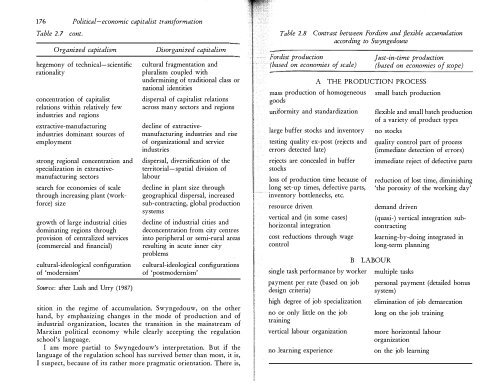The Condition of Postmodernity 13 - autonomous learning
The Condition of Postmodernity 13 - autonomous learning
The Condition of Postmodernity 13 - autonomous learning
Create successful ePaper yourself
Turn your PDF publications into a flip-book with our unique Google optimized e-Paper software.
176 Political-economic capitalist transformationTable 2.7 cont.Organized capitalism Disorganized capitalismhegemony <strong>of</strong> technical- scientific cultural fragmentation andrationalitypluralism coupled withundermining <strong>of</strong> traditional class ornational identitiesconcentration <strong>of</strong> capitalistdispersal <strong>of</strong> capitalist relationsrelations within relatively few across many sectors and regionsindustries and regionsextractive-manufacturingdecline <strong>of</strong> extractivemanufacturingindustries and riseindustries dominant sources <strong>of</strong>employment<strong>of</strong> organizational and serviceindustriesTable 2.8Fordist production(based on economies <strong>of</strong> scale)Contrast between Fordism and flexible accumulationaccording to SwyngedouwAmass production <strong>of</strong> homogeneousgoodsuniformity and standardizationlarge buffer stocks and inventorytesting quality ex-post (rejects anderrors detected late)] ust-in-time production(based on economies <strong>of</strong> scope)THE PRODUCTION PROCESSsmall batch productionflexible and small batch production<strong>of</strong> a variety <strong>of</strong> product typesno stocksquality control part <strong>of</strong> process(immediate detection <strong>of</strong> errors)strong regional concentration andspecialization in extractivemanufacturingsectorssearch for economies <strong>of</strong> scalethrough increasing plant (workforce)sizegrowth <strong>of</strong> large industrial citiesdominating regions throughprovision <strong>of</strong> centralized services(commercial and financial)cultural-ideological configuration<strong>of</strong> 'modernism'dispersal, diversification <strong>of</strong> theterritorial- spatial division <strong>of</strong>labourdecline in plant size throughgeographical dispersal, increasedsub-contracting, global productionsystemsdecline <strong>of</strong> industrial cities anddeconcentration from city centresinto peripheral or semi-rural areasresulting in acute inner cityproblemscultural-ideological configurations<strong>of</strong> 'postmodernism'rejects are concealed in bufferstocksloss <strong>of</strong> production time because <strong>of</strong>long set-up times, defective parts,inventory bottlenecks, etc.resource drivenvertical and (in some cases)horizontal integrationcost reductions through wagecontrolsingle task performance by workerBimmediate reject <strong>of</strong> defective partsreduction <strong>of</strong> lost time, diminishing'the porosity <strong>of</strong> the working day'demand driven(quasi -) vertical integration subcontracting<strong>learning</strong>-by-doing integrated inlong-term planningLABOURmultiple tasksSource: after Lash and Urry (1987)sit ion in the regime <strong>of</strong> accumulation. Swyngedouw, on the otherhand, by emphasizing changes in the mode <strong>of</strong> production and <strong>of</strong>industrial organization, locates the transition in the mainstream <strong>of</strong>Marxian political economy while clearly accepting the regulationschool's language.I am more partial to Swyngedouw's interpretation. But if thelanguage <strong>of</strong> the regulation school has survived better than most, it is,I suspect, because <strong>of</strong> its rather more pragmatic orientation. <strong>The</strong>re is,payment per rate (based on jobdesign criteria)high degree <strong>of</strong> job specializationno or only little on the jobtrainingvertical labour organizationno Jearning experiencepersonal payment (detailed bonussystem)elimination <strong>of</strong> job demarcationlong on the job trainingmore horizontal labourorganizationon the job <strong>learning</strong>
















